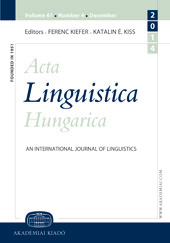Paradigmatic correspondences in the Brazilian Portuguese verbal vowel system
Paradigmatic correspondences in the Brazilian Portuguese verbal vowel system
Author(s): Luiz Carlos SchwindtSubject(s): Phonetics / Phonology, Morphology
Published by: Akadémiai Kiadó
Keywords: vowel harmony; allomorphy; paradigms; morphophonology; Optimality Theory;
Summary/Abstract: In this paper, we reanalyse the alternation in the Brazilian Portuguese verbal system called verbal vowel harmony (VH), which applies to verb stems in the second and third conjugations (e.g., bebér ‘to drink’ > bébo ‘I drink’; segír ‘to follow’ > sígo ‘I follow’). We pose the following questions concerning VH: (i) Is it a synchronic process? (ii) Does it exhibit paradigmatic effects? and (iii) How can it be described in Optimality Theory? To answer question (i), we present a corpus of BP dictionarized verbs in the third person and results from empirical tests that evaluate acceptability/productivity in the conjugation of pseudo-verbs. Concerning question (ii), we show that a paradigmatic correspondence between verbal forms in BP accounts for misapplication patterns. Answering question (iii), we offer a description of the process in line with Transderivational Correspondence Theory (Benua 1997).
Journal: Acta Linguistica Hungarica (Since 2017 Acta Linguistica Academica)
- Issue Year: 54/2007
- Issue No: 4
- Page Range: 393-407
- Page Count: 15
- Language: English

